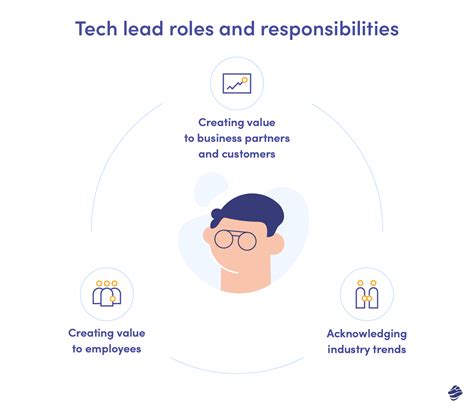As technology continues to evolve and play a vital role in various industries, the demand for skilled tech leaders has increased significantly. A tech lead, also known as a technical lead or lead developer, is a professional responsible for overseeing the technical aspects of a project or organization. In this article, we will delve into the world of tech lead duties and responsibilities, exploring the skills and qualifications required for this role.
What is a Tech Lead?
A tech lead is a technical expert who leads a team of developers, engineers, or other technical professionals in designing, developing, and implementing technology solutions. They are responsible for ensuring that the technical aspects of a project are aligned with the organization's goals and objectives. Tech leads work closely with cross-functional teams, including product management, design, and operations, to deliver high-quality products and services.
Key Responsibilities of a Tech Lead
The responsibilities of a tech lead can vary depending on the organization, project, or industry. However, some of the key duties and responsibilities of a tech lead include:
- Technical Vision and Strategy: Developing and implementing a technical vision and strategy that aligns with the organization's goals and objectives.
- Team Management: Leading and managing a team of technical professionals, including developers, engineers, and other technical staff.
- Project Planning and Execution: Planning and executing technical projects, including defining project scope, timeline, and resources.
- Architecture and Design: Designing and implementing technical architectures and systems, including software, hardware, and infrastructure.
- Coding and Development: Writing high-quality code and participating in the development process.
- Testing and Quality Assurance: Ensuring that technical solutions meet quality and testing standards.
- Communication and Collaboration: Communicating technical information to non-technical stakeholders and collaborating with cross-functional teams.

Skills and Qualifications Required for a Tech Lead
To be successful as a tech lead, an individual should possess a combination of technical, business, and leadership skills. Some of the key skills and qualifications required for a tech lead include:
- Technical Expertise: Strong technical skills and expertise in a specific area, such as software development, engineering, or data science.
- Leadership and Management: Proven leadership and management experience, including team management, project planning, and execution.
- Communication and Collaboration: Excellent communication and collaboration skills, including the ability to communicate technical information to non-technical stakeholders.
- Problem-Solving and Analytical: Strong problem-solving and analytical skills, including the ability to analyze complex technical problems and develop creative solutions.
- Business Acumen: Business acumen and understanding of the organization's goals and objectives.
Benefits of Being a Tech Lead
Being a tech lead can be a rewarding and challenging career path. Some of the benefits of being a tech lead include:
- Career Advancement: Opportunities for career advancement and professional growth.
- Leadership Experience: Gaining leadership experience and developing leadership skills.
- Technical Expertise: Developing and maintaining technical expertise in a specific area.
- Collaboration and Communication: Collaborating with cross-functional teams and communicating technical information to non-technical stakeholders.

Challenges Faced by Tech Leads
While being a tech lead can be a rewarding career path, it also comes with its own set of challenges. Some of the challenges faced by tech leads include:
- Technical Complexity: Managing technical complexity and ensuring that technical solutions meet quality and testing standards.
- Team Management: Managing a team of technical professionals and ensuring that they are motivated and engaged.
- Communication and Collaboration: Communicating technical information to non-technical stakeholders and collaborating with cross-functional teams.
- Staying Up-to-Date with Technology: Staying up-to-date with the latest technology trends and advancements.
Best Practices for Tech Leads
To be successful as a tech lead, it's essential to follow best practices. Some of the best practices for tech leads include:
- Stay Up-to-Date with Technology: Staying up-to-date with the latest technology trends and advancements.
- Communicate Effectively: Communicating technical information to non-technical stakeholders and collaborating with cross-functional teams.
- Lead by Example: Leading by example and demonstrating technical expertise and leadership skills.
- Foster a Positive Team Culture: Fostering a positive team culture and ensuring that team members are motivated and engaged.

Gallery of Tech Lead Roles and Responsibilities






FAQs
What is a tech lead?
+A tech lead is a technical expert who leads a team of developers, engineers, or other technical professionals in designing, developing, and implementing technology solutions.
What are the key responsibilities of a tech lead?
+The key responsibilities of a tech lead include developing and implementing a technical vision and strategy, leading and managing a team of technical professionals, and communicating technical information to non-technical stakeholders.
What skills and qualifications are required for a tech lead?
+A tech lead should possess a combination of technical, business, and leadership skills, including technical expertise, leadership and management experience, and excellent communication and collaboration skills.
In conclusion, being a tech lead can be a rewarding and challenging career path. It requires a combination of technical, business, and leadership skills, including technical expertise, leadership and management experience, and excellent communication and collaboration skills. By following best practices and staying up-to-date with the latest technology trends and advancements, tech leads can deliver high-quality products and services and achieve their career goals.
